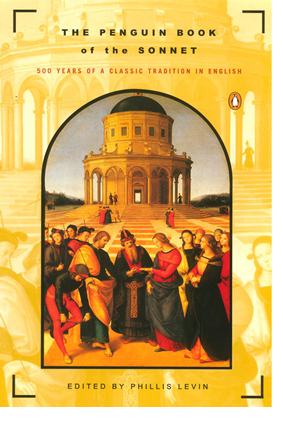The Penguin Book of the Sonnet
 Edited and with an Introduction by Phillis Levin
Edited and with an Introduction by Phillis Levin
Penguin Books (November 2001), paperback, 526 pages, 5.9 x 9 inches, $25.00
ISBN-10: 0140589295 / ISBN-13: 978-0140589290
Purchase: Penguin / Amazon / IndieBound
From the publisher: A unique anthology celebrating that most vigorous of literary forms--the sonnet. The sonnet is one of the oldest and most enduring literary forms of the post-classical world, a meeting place of image and voice, passion and reason, elegy and ode. It is a form that both challenges and liberates the poet. For this anthology, poet and scholar Phillis Levin has gathered more than 600 sonnets to tell the full story of the sonnet tradition in the English language. She begins with its Italian origins; takes the reader through its multifaceted development from the Elizabethan era to the Romantic and Victorian; demonstrates its popularity as a vehicle of protest among writers of the Harlem Renaissance and poets who served in the First World War; and explores its revival among modern and contemporary poets. In her vibrant introduction, Levin traces this history, discussing characteristic structures and shifting themes and providing illuminating readings of individual sonnets. She includes an appendix on structure, biographical notes, and valuable explanatory notes and indexes. And, through her narrative and wide-ranging selection of sonnets and sonnet sequences, she portrays not only the evolution of the form over half a millennium but also its dynamic possibilities.
UK Edition
Abridged edition with preface: hardcover. {Reviews below refer to US paperback edition}
Allen Lane/The Penguin Press (November 2001)
Purchase the UK Edition from Amazon
PRAISE
"Phillis Levin collects classic and subversive versions of this most traditional form. [Levin’s] introduction alone is really an intellectual history of the West by way of the sonnet. This is one of my desert-island books!"
—Kimiko Hahn
"Thanks to Penguin Books for offering their readers half a millennium of the sonnet in English—edited and introduced with wisdom and generosity—a treasure-trove of the first order."
—Robert Fagles, Arthur W. Marks ’19 Professor of Comparative Literature, Princeton University, and award-winning translator of Homer
"As Phillis Levin so rightly puts it, the sonnet is about process, being a movement that leads from image to insight, from inquiry to understanding. She has undertaken this autobiography of a literary form with sustained knowledge from early to now, intimate comprehension, remarkable clarity and elegance of style, leading all of us enthusiasts of poetry to a new understanding. It is a kind of twenty-first-century miracle, and we are all more than grateful."
—Mary Ann Caws, Distinguished Professor of English, French, and Comparative Literature, The Graduate Center, City University of New York
"Edited by the superb poet Phillis Levin, this collection and its exemplary introduction bring the sonnet vibrantly into the twenty-first century. Levin’s prose and her taste seem themselves nourished by the elegant excessiveness the sonnet transforms into strange and moving precision."
—Charles Altieri, Professor of English and Director, Consortium for the Arts, University of California, Berkeley
From Library Journal:
This compact text is a biography of the sonnet as composed in English. In an introductory essay, Levin discusses the sonnet's origins, history, traditions, and possibilities, including its use by poets of the Harlem Renaissance and veterans of World War I as a form of protest. Interwoven with the history are approaches to interpreting and criticizing this poetic form. The bulk of the text is an anthology of over 600 sonnets composed by more than 230 poets. Over 150 of the poets represented wrote during the 20th century. The text is enriched with an appendix covering sonnet patterns and variations, brief biographies of the poets, a list of additional readings, and indexes of authors, titles, and first lines. No recent publication on sonnets has included such a broad spectrum of sonnet writers or attempted to present so complete a history of the sonnet. Recommended for all public and academic libraries.
—Shana C. Fair, Ohio University, Zanesville